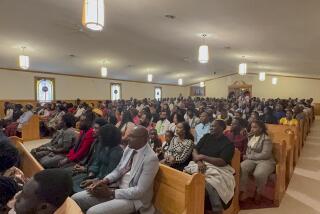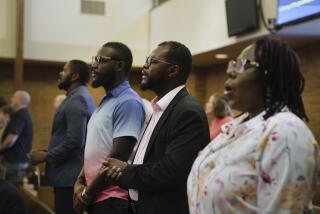Standing on Faith, Some U.S. Citizens Stay in Haiti
PORT-AU-PRINCE, Haiti â The American Embassy has been shuttered for a week, and U.S. citizens have been warned to leave. But despite a spreading rebellion, one intrepid if dwindling group is hanging on, fired by their faith and a sense of duty toward ordinary Haitians.
âIf we leave, we are saying that our trust no longer is in our God, and the needs of the people we are leaving are not important,â said Susan Hill, a Buffalo, N.Y., native who is the office manager for Haitiâs largest English-speaking nondenominational church, Quisqueya Chapel.
Among the 20,000 to 22,000 U.S. citizens who live in Haiti, the poorest nation in the Western Hemisphere, missionaries and laypeople involved in humanitarian work may make up the largest professional category.
Many have developed deep emotional ties to the people they serve as well as a philosophical appreciation of the risks they may now be running.
If she leaves, said Linda Counts, 63, as many as 90 children and adults could starve to death. Along with her husband, Tom, a retired Baptist and Methodist minister from Meade, Kan., she runs a free English-language school in the carport of their Port-au-Prince home. Like her staff, the young pupils receive free meals and medical care, which many would not get otherwise.
âWhatâs keeping us here is knowing that if we walked out, things would just completely fall apart,â said Counts, a resident of Haiti since 1994. Every summer when the couple close the school and take two monthsâ leave in the United States, the studentsâ health suffers. One boy almost died during their absence because he was reduced to eating dirt, Counts said.
U.S. Embassy spokeswoman Judith Trunzo said Friday that there was no reliable way to know how many Americans remained in Haiti, where armed rebels have been steadily gaining ground against forces loyal to President Jean-Bertrand Aristide.
The embassy, now guarded by a rooftop machine-gun nest manned by Marines, was closed Feb. 20, and nonessential staff and their dependents were evacuated. The previous day, U.S. citizens were advised by the Bush administration in the strongest terms to go, the culmination of weeks of State Department warnings.
âFirst we asked people to consider leaving, then we asked them to make plans for leaving,â Trunzo said. âThen we told them to leave.â
Over the last week, many U.S. religious groups with a strong presence in Haiti, including Baptists, Mennonites, Nazarenes and Mormons, have ordered their missionaries and other staff withdrawn, according to colleagues who have elected to remain.
One small U.S. aviation company that caters to missionaries flew its two vintage, propeller-driven DC-3s out of Port-au-Prince on Thursday, taking several Americans and their families home.
âNot a single person wanted to leave,â Hill said. âThey were crying as they left.â
Counts said she and her husband, who use their retirement savings to support the school and an adjoining guesthouse for missionaries, have been able to remain in the country because they donât have to answer to a large religious organization that may be skittish after weeks of dramatic news coverage of Haitiâs violent unrest. Their board of trustees in the United States is made up of family members who trust their judgment, the former food-service worker said.
âWhen we say, âWeâre going to stay,â they say, âGo for it,â â Counts said.
Dorothy Diehl, 59, a former supermarket manager from Bethel, Ohio, distributes Creole-language Bibles and operates a mobile health clinic in the impoverished Haitian countryside.
She had to run gantlets of armed thugs to escort a departing couple to Port-au-Prince on Wednesday, she said, and almost had the windshield of her Chevrolet Blazer smashed by youths as she left the airport. Like the Counts, she uses her Social Security and pension income to finance her evangelizing and other activities. Sheâs free to decide whether to depart.
âGod sent me to Haiti, and God hasnât told me to leave,â said Diehl, who came to the Caribbean republic two years ago and married her former translator. At one roadblock where she was recently halted, said the American with ash-blond hair, she was relieved to hear an armed man call her âcherie,â French for âdear.â
On Thursday, Hill, a single parent, celebrated her 52nd birthday with three of her four sons, a Haitian daughter-in-law and a 2-year-old grandson. She said she feels safer in Haiti, where she has lived for nearly five years, than in any American city, although the walled Port-au-Prince compound where she works had an armed guard Friday.
After talking and praying together, Hill said, she and her family decided to stay in Haiti. âThis is where we live,â she said. âIf we leave, weâre saying, âWhat, weâre just here for the good?â They need us now more than ever.â
More to Read
Sign up for Essential California
The most important California stories and recommendations in your inbox every morning.
You may occasionally receive promotional content from the Los Angeles Times.










